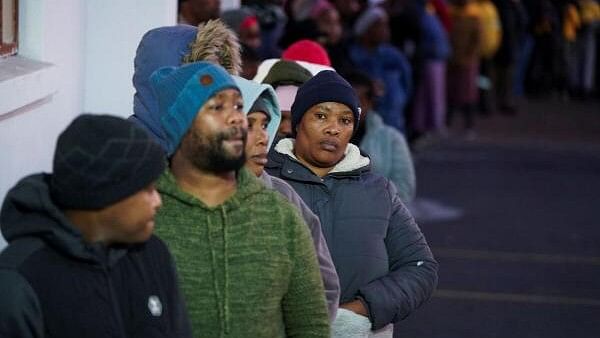
People queue to vote in the South African elections in Masiphumelele, South Africa, May 29, 2024.
Credit: Reuters Photo
Soweto, South Africa: South Africans began voting on Wednesday in the most competitive election since the end of apartheid, with opinion polls suggesting the African National Congress (ANC) will lose its parliamentary majority after 30 years in government.
Polling stations opened at or shortly after 7 am (05 00 GMT), with voters queuing at some locations including Hitekani Primary School in the vast township of Soweto near Johannesburg, where President Cyril Ramaphosa was expected to vote later.
Security guard Shivambu Yuza Patric, 48, came straight to the polling station after working a night shift. He said he had not voted in the previous election because he had lost faith in the ANC, but he was hopeful this election would bring change.
"They do nothing for the people," he said of the ANC. He said he would decide at the last minute who to vote for but was leaning towards small opposition party ActionSA.
Then led by Nelson Mandela, the ANC swept to power in South Africa's first multi-racial election in 1994 and has won a majority in national elections held every five years since then, though its share of the vote has gradually declined.
If it falls short of 50 per cent this time, the ANC will have to make a deal with one or more smaller parties to govern - uncharted and potentially choppy waters for a young democracy that has so far been utterly dominated by a single party.
However, the ANC is still on course to win the largest share of the vote, meaning that its leader Ramaphosa is likely to remain in office, unless he faces an internal challenge if the party's performance is worse than expected.
Voter dissatisfaction over high rates of unemployment and crime, frequent power blackouts and corruption in party ranks lies behind the ANC's gradual fall from grace.
'FRESH MINDS'
"I voted for the EFF and that's because I need fresh minds in parliament," said Andrew Mathabatha, 40, a self-employed engineer, who arrived early to vote at the Midrand High School in a northern suburb of Johannesburg.
He was referring to the Economic Freedom Fighters, a party founded by Julius Malema, a firebrand former leader of the ANC's youth wing. It wants to nationalise mines and banks and seize land from white farmers to address racial and economic disparities.
"I feel like the current government is slow in terms of implementing certain things and I just think that it’s time for a different way of thinking and doing things," Mathabatha said.
More than 27 million South Africans are registered to vote at more than 23,000 polling stations that will be open until 9 pm (19 00 GMT).
Voters will elect provincial assemblies in each of the country's nine provinces, and a new national parliament which will then choose the next president.
Among opposition parties vying for power is the pro-business Democratic Alliance, which won the second-largest vote share in 2019 and has formed an alliance with several smaller parties to try to broaden its appeal.
Former president Jacob Zuma is backing a new party called uMkhonto we Sizwe (MK), named after the ANC's former armed wing. Zuma, who was forced to quit as president in 2018 after a string of scandals, has enduring influence, particularly in his home province of KwaZulu-Natal.
The election commission is expected to start releasing partial results within hours of polling stations closing. The commission has seven days to announce final results but at the last election, also held on a Wednesday, it did so on a Saturday.